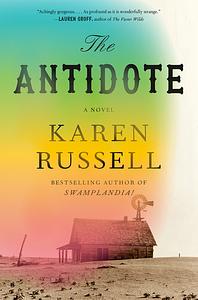Take a photo of a barcode or cover
In case I ever manage to make a class about this book, I would assign it alongside Cara Finnegan, Emerson Cram, and possibly Zitkala Sa and Connie Walker, for both contemporary and modern native voices on residential schools.
mysterious
reflective
slow-paced
Plot or Character Driven:
A mix
Strong character development:
Yes
Loveable characters:
Complicated
Diverse cast of characters:
Yes
Flaws of characters a main focus:
Yes
4 Stars ✨
The Antidote is a magical, immersive, and deeply atmospheric story set against the haunting backdrop of the Dust Bowl era. The author masterfully blends historical detail with the supernatural, crafting a narrative that feels both grounded in time and utterly otherworldly. The fictional town of Uz, Nebraska, is richly imagined, and the lives of its people are rendered with empathy, depth, and historical resonance.
Told through five distinct points of view, the novel excels in giving each narrator a unique and authentic voice. Among them, the Prairie Witch stands out as one of the most compelling characters I’ve encountered this year—and that’s saying something, as this is approximately book 140 for me. While I appreciated all the POVs, I found myself especially eager to return to her chapters.
The Prairie Witch acts as a “memory vault” for the townspeople, allowing them to deposit memories that weigh heavily on them. Through this motif, the novel explores themes of memory, storytelling, and the consequences of misremembering or rewriting the past. It’s a powerful meditation on how histories—personal and collective—are shaped and sometimes distorted over time.
The book seamlessly weaves together elements of historical fiction, magical realism, and a murder mystery, all of which are executed well. I strongly encourage readers to approach this story with an open mind; the lessons it imparts feel both timeless and timely. If you're in the mood for historical fiction that defies convention and lingers long after the last page, this is one to pick up.
The audiobook is also a standout, featuring multiple narrators who bring the different perspectives vividly to life.
One line from the synopsis beautifully encapsulates the book’s essence:
“The Antidote is above all a reckoning with a nation’s forgetting—enacting the settler amnesia and willful omissions passed down from generation to generation and unearthing not only horrors but shimmering possibilities.”
The Antidote is a magical, immersive, and deeply atmospheric story set against the haunting backdrop of the Dust Bowl era. The author masterfully blends historical detail with the supernatural, crafting a narrative that feels both grounded in time and utterly otherworldly. The fictional town of Uz, Nebraska, is richly imagined, and the lives of its people are rendered with empathy, depth, and historical resonance.
Told through five distinct points of view, the novel excels in giving each narrator a unique and authentic voice. Among them, the Prairie Witch stands out as one of the most compelling characters I’ve encountered this year—and that’s saying something, as this is approximately book 140 for me. While I appreciated all the POVs, I found myself especially eager to return to her chapters.
The Prairie Witch acts as a “memory vault” for the townspeople, allowing them to deposit memories that weigh heavily on them. Through this motif, the novel explores themes of memory, storytelling, and the consequences of misremembering or rewriting the past. It’s a powerful meditation on how histories—personal and collective—are shaped and sometimes distorted over time.
The book seamlessly weaves together elements of historical fiction, magical realism, and a murder mystery, all of which are executed well. I strongly encourage readers to approach this story with an open mind; the lessons it imparts feel both timeless and timely. If you're in the mood for historical fiction that defies convention and lingers long after the last page, this is one to pick up.
The audiobook is also a standout, featuring multiple narrators who bring the different perspectives vividly to life.
One line from the synopsis beautifully encapsulates the book’s essence:
“The Antidote is above all a reckoning with a nation’s forgetting—enacting the settler amnesia and willful omissions passed down from generation to generation and unearthing not only horrors but shimmering possibilities.”
adventurous
challenging
dark
emotional
hopeful
reflective
sad
tense
fast-paced
Plot or Character Driven:
A mix
Strong character development:
Yes
Loveable characters:
Yes
Diverse cast of characters:
Yes
Flaws of characters a main focus:
Complicated
challenging
informative
mysterious
slow-paced
adventurous
emotional
hopeful
mysterious
reflective
sad
tense
medium-paced
Plot or Character Driven:
A mix
Strong character development:
Yes
Loveable characters:
Yes
Diverse cast of characters:
Yes
Flaws of characters a main focus:
Yes
Not the right time for this one, alas. Maybe I'll try again some other time.
emotional
funny
hopeful
informative
reflective
medium-paced
emotional
medium-paced
Plot or Character Driven:
Character
Strong character development:
Yes
Loveable characters:
Yes
Diverse cast of characters:
Yes
“Dear Mama, What does it mean that I am certain you are with me? Sometimes I doubt God, but never you.”
challenging
dark
emotional
hopeful
inspiring
reflective
sad
tense
slow-paced
Plot or Character Driven:
Character
Strong character development:
Yes
Loveable characters:
Complicated
Diverse cast of characters:
Yes
Flaws of characters a main focus:
Yes
An ambitious historical fiction with elements of magical realism. Set in the fictional town of Uz, Nebraska between two real life climatological catastrophes; the Black Sunday duststorm on April 14, 1935, and the Republican River flood on May 31, 1935. In the intervening days we are immersed in the stories of a number of Uz residents. Each has an important place in the big picture of the story, but sometimes all of their individual plotlines seemed incongruous to the larger narrative. Big topics are addressed in this highly imaginative book, including the mistreatment of multiple classes of people - among them immigrants, women, blacks, and native Americans. It illustrates how the mistakes of the past will repeat when they are not remembered, or are deliberately erased, and humanity pays a heavy toll for this often intentional refusal to learn the lessons of history. "But when many thousands of us decide to forget the same truths, what happens? Look at what is happening to the soil without roots. We are the children of these crimes of memory, and we go on committing them." The tension slowly mounts as the book progresses - people pushed to the limit by nature's dry, harsh wind. Nerves fray, tempers flash, guilt and fear and anger build to an explosive climax. "In the Book of Job, what God reveals inside the whirlwind cannot be written down. The omission made more sense to me now, listening to birdsong. Already, God has translated the answer into everything living. It was Job's ears that needed tuning. The whirlwind gave Job a powerful instruction, and so did the great quiet left in its wake. The silence of God is not so silent after all. It is teaching me how to listen." This is a dark, heavy, fantastical, hopeful book - not a feel-good story, but an important one, one that leaves a lasting impression.





